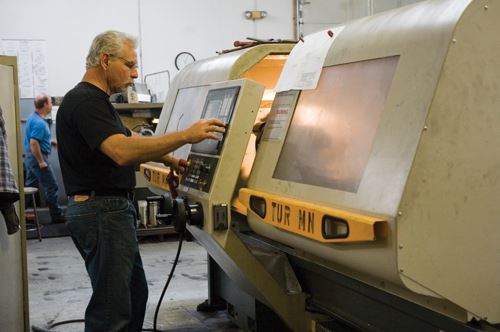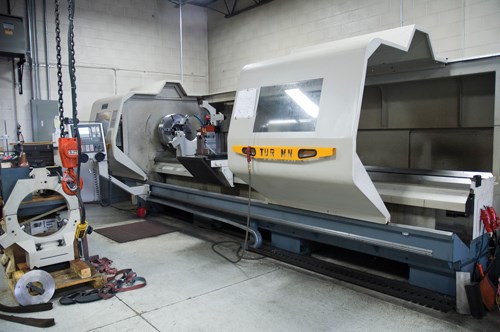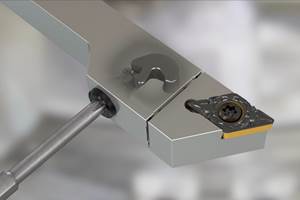CNC Lathes Help Expand Business, Cut Costs
Lathes from Toolmex Machinery have saved this shop time and money by reducing cycle times, achieving tighter tolerances and lessening scrap.
Share




In 2008, family-owned machine shop Leaf Technology took an order for 12- by 14-foot shafts from a long-time customer in the mining industry. At the time, none of the company’s machines could accommodate work of that size, leading it to shop around for a larger, longer-bed CNC lathe. However, the machine it purchased—a TUR930MN Manual Plus CNC from Toolmex Machinery (Natick, Massachusetts)—wasn’t chosen just for extra capacity. Compared to performance estimates of similar machines the shop considered, the TUR930 could take 25 percent fewer passes per part and maintain tighter tolerances in heavy cuts.
"Prior to the purchase of the TUR930, about 5 percent of our business was repairing and machining parts for our customer in the mining industry," says Kevan Leaf, company vice president. "Now, we’ve been able to boost that to 35 percent. The customer liked what we were doing so much that it just kept giving us more and more."
The shop, which specializes in turned pump parts for customer applications ranging from refineries to power plants and water treatment facilities, was no stranger to the Toolmex product line when it purchased the TUR930. Among the various machines housed at its 10,000-square-foot facility in Hartland, Wisconsin are two 25-hp, TUR630 lathes measuring 25 by 80 inches between centers, as well as several TUR Manual lathes.
Mr. Leaf says he was initially attracted to the product line because of its flexibility—the Manual Plus CNC models can be run manually for single parts and in CNC mode for larger-volume jobs. Additionally, the machines’ Tri-V bedways provide the rigidity required to make tight-tolerance cuts in tough materials, such as high-nickel alloy or high-end stainless steel. "At tradeshows, everyone has pieces of aluminum in their lathes, but anything can look good cutting aluminum," he explains. "We knew that the Toolmex lathes could do more than that—they can and do handle the day-to-day abuses of tougher materials."
Also, the machines’ conversational CNCs enable the shop to meet what Mr. Leaf says is a significant challenge: managing costs while maximizing productivity in short-run work. "We need to build parts on the fly rather than having an engineer sit down, program a part and then run it," he explains. "That wouldn’t be cost-effective for us or enable us to get customers’ parts done on time."
Mr. Leaf adds that the TUR-MN Siemens Manual Plus CNC package common to all his Toolmex lathes provides flexibility for conversational, two-axis programming. He adds that the CNC is user-friendly and requires minimal G-code knowledge and experience, leading Leaf Technology machinists to prefer it to the shop’s other controls. Features include a range of cycles, easy-to-understand graphics, and constant surface speed (CSS) capability.
The CNC’s thread-repair cycles are especially useful, Mr. Leaf notes, adding that even taper threads are easy to repair. The shop’s machinists appreciate the control’s ability to easily pick up an old thread, as well as its auto-sync capability, which synchronizes the spindle with the machine axes. "To repair defective threads, whether on the part’s OD or ID, all we have to do is create a short program indicating where to start and stop threading, position the tool in the good part of the thread and make a few keystrokes."
Leaf Technology has also reduced waste and scrap materials. In the past, with its old technology, processes and equipment, the shop scrapped almost 6 percent of all material. With the Toolmex TUR-MN lathes, the shop has brought that figure down to just less than 2 percent.
Leaf Technology, Inc.
512 East Industrial Drive
Hartland, WI 53029
Phone: 262.369.2260
Fax: 262.369.2262
E-mail leaftech@leaftech.com
Related Content
Custom Motorcycle Parts Made Here: Video Tour of a Family-Owned CNC Machine Shop
Lee Wimmer invited us to tour his second-generation family-owned machine shop in Perkasie, PA. This video explores the production processes behind precision-machined parts for both Wimmer Custom Cycle and LS Wimmer Machine Co., and shows how ingenuity and determination are still at the heart of American manufacturing. Today, both companies are now managed by Wimmer’s three sons.
Read MoreA History of Precision: The Invention and Evolution of Swiss-Style Machining
In the late 1800s, a new technology — Swiss-type machines — emerged to serve Switzerland’s growing watchmaking industry. Today, Swiss-machined parts are ubiquitous, and there’s a good reason for that: No other machining technology can produce tiny, complex components more efficiently or at higher quality.
Read MoreInverting Turning and Five-Axis Milling at Famar
Automation is only the tip of the iceberg for Famar, which also provides multitasking options for its vertical lathes and horizontal five-axis machine tools.
Read MoreQuick-Change Tool Heads Reduce Setup on Swiss-Type Turning Centers
This new quick-change tooling system enables shops to get more production from their Swiss turning centers through reduced tool setup time and matches the performance of a solid tool.
Read MoreRead Next
Registration Now Open for the Precision Machining Technology Show (PMTS) 2025
The precision machining industry’s premier event returns to Cleveland, OH, April 1-3.
Read More5 Rules of Thumb for Buying CNC Machine Tools
Use these tips to carefully plan your machine tool purchases and to avoid regretting your decision later.
Read MoreSetting Up the Building Blocks for a Digital Factory
Woodward Inc. spent over a year developing an API to connect machines to its digital factory. Caron Engineering’s MiConnect has cut most of this process while also granting the shop greater access to machine information.
Read More




































